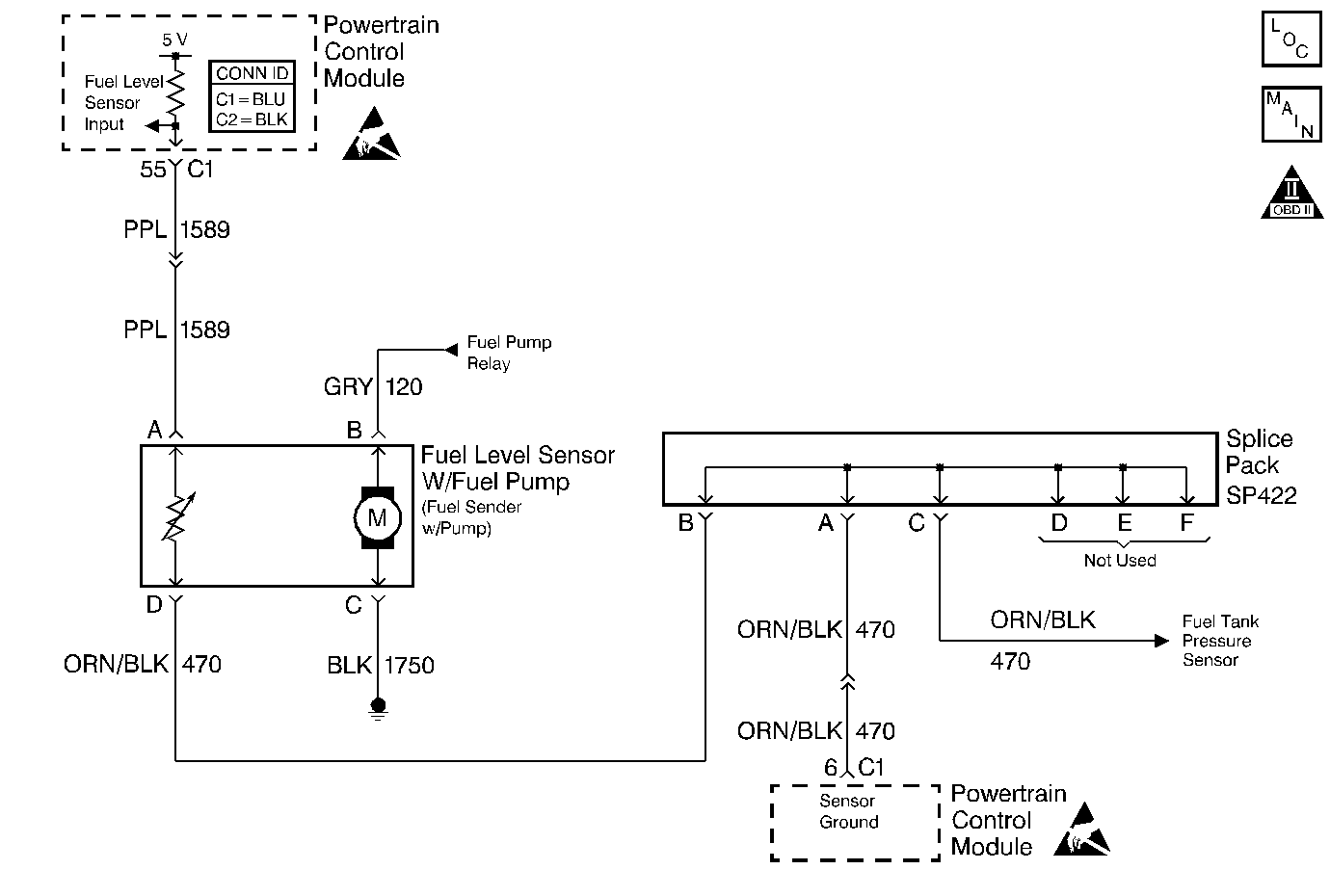
Circuit Description
The powertrain control module (PCM) uses the fuel level input in order to calculate the expected vapor pressures within the fuel system. These vapor pressures vary as the fuel level changes. The vapor pressure is critical in determining if the Evaporative Emissions System is operating properly. The PCM also uses the fuel level in order to determine if the fuel level is too high or too low to be able to accurately detect EVAP system malfunction.
Conditions For Running the DTC
The ignition switch is in the RUN position.
Conditions For Setting the DTC
The fuel level sensor should be more than 98 percent for more than 25 seconds.
Action Taken When the DTC Sets
| • | The PCM records the operating conditions at the time the diagnostic fails. The Failure Records buffers will store this information. |
| • | A history DTC is stored. |
| • | The fuel tank level defaults to 40 percent. |
Conditions for Clearing the DTC
| • | A history DTC clears after 40 consecutive warm up cycles without a fault. |
| • | Use a scan tool to clear the DTCs. |
Diagnostic Aids
An intermittent may be caused by any of the following conditions:
| • | A poor connection |
| • | Rubbed through wire insulation |
| • | A broken wire inside the insulation |
Thoroughly test any circuitry that is suspected of causing the intermittent complaint. Refer to Testing for Intermittent Conditions and Poor Connections in Wiring Systems.
If a repair is necessary, refer to Wiring Repairs or Connector Repairs in Wiring Systems.
Test Description
The numbers below refer to the step numbers on the diagnostic table:
-
This step determines if the malfunction is present.
-
Using the Freeze Frame and/or Failure Records data may aid in locating an intermittent condition. If you cannot duplicate the DTC, the information included in the Freeze Frame and Failure Records data can help determine how many miles since the DTC set. The Fail Counter and Pass Counter can also help determine how many ignition cycles the diagnostic reported a pass or fail. Operate the vehicle within the same Freeze Frame conditions (RPM, load, vehicle speed, temperature, etc.) that you observed. This will isolate when the DTC failed.
-
Use the connector test adapter kit to avoid damage to the harness connector terminals.
-
The replacement PCM must be programmed and the Crankshaft Position System Variation Learn procedure must be performed.
Step | Action | Values | Yes | No |
|---|---|---|---|---|
1 | Did you perform the Powertrain On-Board Diagnostic (OBD) System Check? | -- | ||
Does the fuel level sensor parameter read above the specified value? | 98 % | |||
Does the DTC reset? | -- | Go to Diagnostic Aids | ||
Does the fuel level sensor signal circuit voltage read near the specified value? | 5.0 V | |||
5 |
Did you find and correct the condition? | -- | ||
6 | With a test lamp connected to B+, probe the fuel level sensor ground circuit. Does the test lamp illuminate? | -- | ||
7 |
Did you find and correct the condition? | -- | ||
8 |
Did you find and correct the condition? | -- | ||
9 |
Does the DMM display continuity within the specified range from the fuel level sensor signal circuit to any other PCM circuit? | 0-2ohms | ||
10 |
Did you find and repair the condition? | -- | ||
11 | Repair the fuel level sensor ground circuit. Refer to Wiring Repairs in Wiring Systems. Did you complete the repair? | -- | ||
12 | Repair the short between the fuel level sensor signal circuit and the PCM circuit that had continuity. Refer to Wiring Repairs in Wiring Systems. Did you complete the repair? | -- | -- | |
13 | Replace the fuel level sensor. Refer to Fuel Level Sensor Replacement Did you complete the replacement? | -- | -- | |
|
Important:: The replacement PCM must be programmed. Replace the PCM. Refer to Powertrain Control Module Replacement/Programming . Did you complete the replacement? | -- | -- | ||
15 |
Does the DTC reset? | -- | System OK |
